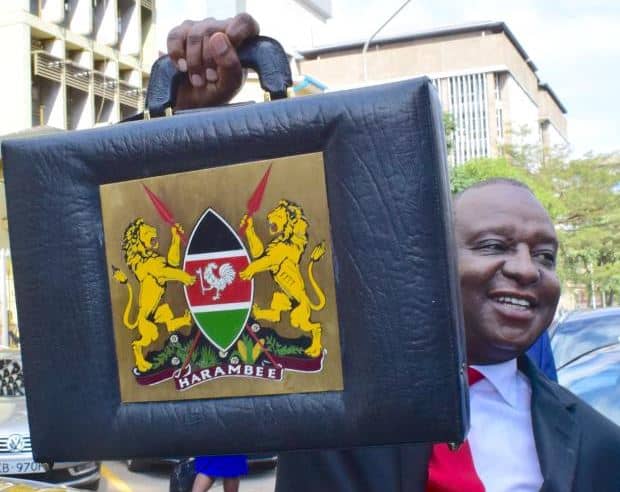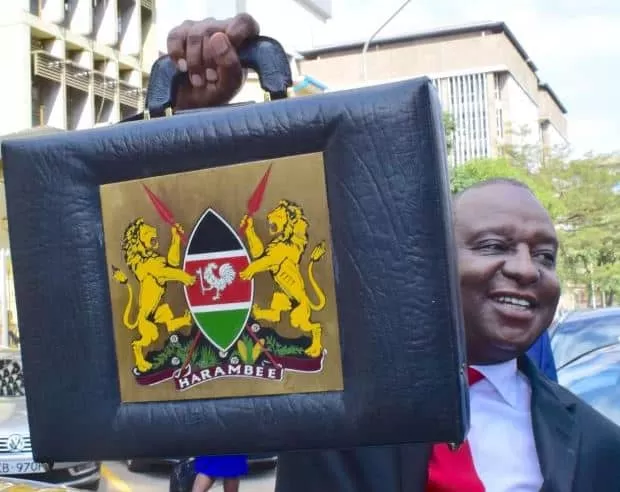

Jubilee administration’s ambitious spending has pushed Kenyans to a tight corner at a time when the country’s revenue has remained stagnant over the years.
In a move seen to accommodate campaign pledges, President Uhuru Kenyatta has spent more than Sh10 trillion in the last six years but only managed to raise about Sh6 trillion in tax revenue.
Today’s budget will be the seventh where the National Treasury plans to spend Sh3 trillion against Sh1.8 trillion in tax revenues, which has already been described as “overly optimistic”.
To finance the budget, Treasury Cabinet Secretary Henry Rotich might hit Kenyans hard with new taxes. This could be through raising Value Added Tax (VAT) from the current 16 per cent – the lowest among the East African Community nations. Other likely targets are the betting industry and capital gains tax, which targets the wealthy.
Uganda and Tanzania, whose budgets will also be unveiled today, charge 18 per cent VAT.
Taxation experts, after a lengthy review of the options available to Rotich, are predicting the VAT will be his soft option owing to its lower rate compared to the country’s neighbours.
Any marginal increase in VAT, which is an indirect tax that is lumped on the cost of nearly all goods and services, could be the silver bullet in a tough year that has seen Mr Rotich set an extremely ambitious revenue target of Sh2.2 trillion, up from Sh1.9 trillion.
But the more burning question is how such mind-blowing numbers are not translating to more money for the ordinary folk with economists arguing that the investment of the funds is misplaced if the intended beneficiary was Wanjiku, at least in the short-term.
Legislators whose role is oversight on government spending have faulted the current budget citing that it is premised on weak economic fundamentals and manipulating the numbers to downplay the overspending or overstate projected revenues.
Specifically, the MPs have accused the National Treasury of repeated failure to adhere to resolutions of Parliament by getting on a spending spree while ignoring the amount of available resources.
“Failure to commit to agreed expenditure ceiling ignores the macroeconomic projections – an outcome that is self-defeating given that many times, the budget has to be redone to take into account a limited resource envelope,” said Kimani Ichung’wah, the chairman of the Budget and Appropriations Committee.
Exaggerating the projected revenues was called out as a deliberate attempt to try accommodate the oversized spending plans which include generous allocations for recurrent expenditures such as foreign travels.
Rotich, the MPs said, raised the projected revenues – which consist mostly taxes, by Sh35 billion to justify an increment of Sh78 billion over the original estimates in the initially approved Budget Policy Statement.
MPs, however, did not help matters in their reservations about the State’s spending spree, instead reviewing the budget by taking out some items and introducing many more with an overall net effect of an additional Sh25 billion.
Take a miracle
Among the budget items that received additional funding is the Sh3 billion for the National Government Constituency Development Fund where the MPs are patrons, and another Sh1 billion to the Ministry of Foreign Affairs to cater for meetings and committee sittings.
With that, Parliament had further complicated the work of Kenya Revenue Authority which has repeatedly failed in hitting the revenue targets for the last nine years, including in the current year where the deficit so far is Sh450 billion.
With a monthly collection slightly over Sh110 billion, it would take a miracle for the target to be attained meaning the deficit streak will only be extended.
And today, Rotich will be tasking James Mburu, the newly-appointed KRA boss, with the mission impossible in collecting Sh1.8 trillion in ordinary taxes – including Income Tax, Value Added Tax, Import and Excise Duties among others.
Most of the income taxes are paid by salaried individuals as Pay As You Earn, and corporations, both being unlikely candidates for review, according to tax experts.
However, taxes on gains from the buying and selling of assets – technically known as Capital Gains Tax currently levied at 5 per cent could be raised, Philip Muema of Andersen Tax told The Standard.
Deepak Dave, the founder of advisory firm Riverside Capital, says the working class are overburdened by the current taxation regime, which lends huge concessions to the wealthier in society.
“Broadening the tax net has to be a priority – the current system is not generating enough to sustain Government’s role in economic growth,” he said, citing that the wealthier are paying less than their fair share of taxes.
As an illustration for his point, Dave explains that the PAYE system generates a third of government revenues from only a tenth of the population.
Out of the structure, the income tax system manages to tax housemaids and casual workers with higher rates than owners of the land they work on and the slumlords they pay rent to.
With little room to raise taxes, the Government has increased borrowing to fund the widening deficit—the difference between the expenditure and expenses, to a level where the country is spending more than half of the tax revenue to settle debts.
In the financial year that begins July 1, Kenya will spend Sh800 billion to repay maturing loans mostly owed to foreign lenders.
Rotich’s budget today will crown the total Jubilee administrations ambitious spending to Sh13 trillion over eight years against total tax collections of less than Sh8 trillion. Swelling national budgets have tightened household spending as the Government races to fill the gaping hole plugged through borrowing.
Revenues raised through taxing the Mwananchi have perpetually lagged expenditures, some continuously questioned if they are value for money.
It is the reality that Kenyans must learn to live with, that the country has simply been living beyond its means against a backdrop of rising taxes – including new ones Rotich is expected to unveil this afternoon.
Nahashon Mathenge, a senior Tax Manager at PKF Consulting, said taxpayers should be involved in the drafting of such taxes as they are the most important cog in revenue collection.
“Taxpayers are a key element in the tax revenue collection of any government and therefore they should be given priority in recognizing their views especially towards amendment and interpretation of the tax laws,” Mathenge said.
He added that such participation would enhance compliance in the tax administration to both taxpayers and KRA.
The U.S.-based driver training company Zutobi analyzed road safety worldwide and found South Africa stays last in driving danger since…
The Basketball Africa League (BAL) returns for its 2025 season with exciting changes and developments. Since 2019 the NBA-linked basketball…
The Somali president supports their military forces to eliminate the threats from Al-Shabaab, ISIS, and Al-Qaeda. The Somali National Army…
UAE President Sheikh Mohamed bin Zayed Al Nahyan held talks with President Faustin Archange Touadéra of the Central African Republic…
African football teams struggle intensely in the World Cup Qualification rounds to earn their place on the international football stage.…
The journey toward the 2026 FIFA World Cup is rapidly intensifying for all African teams, who now hold a historical…
This website uses cookies.